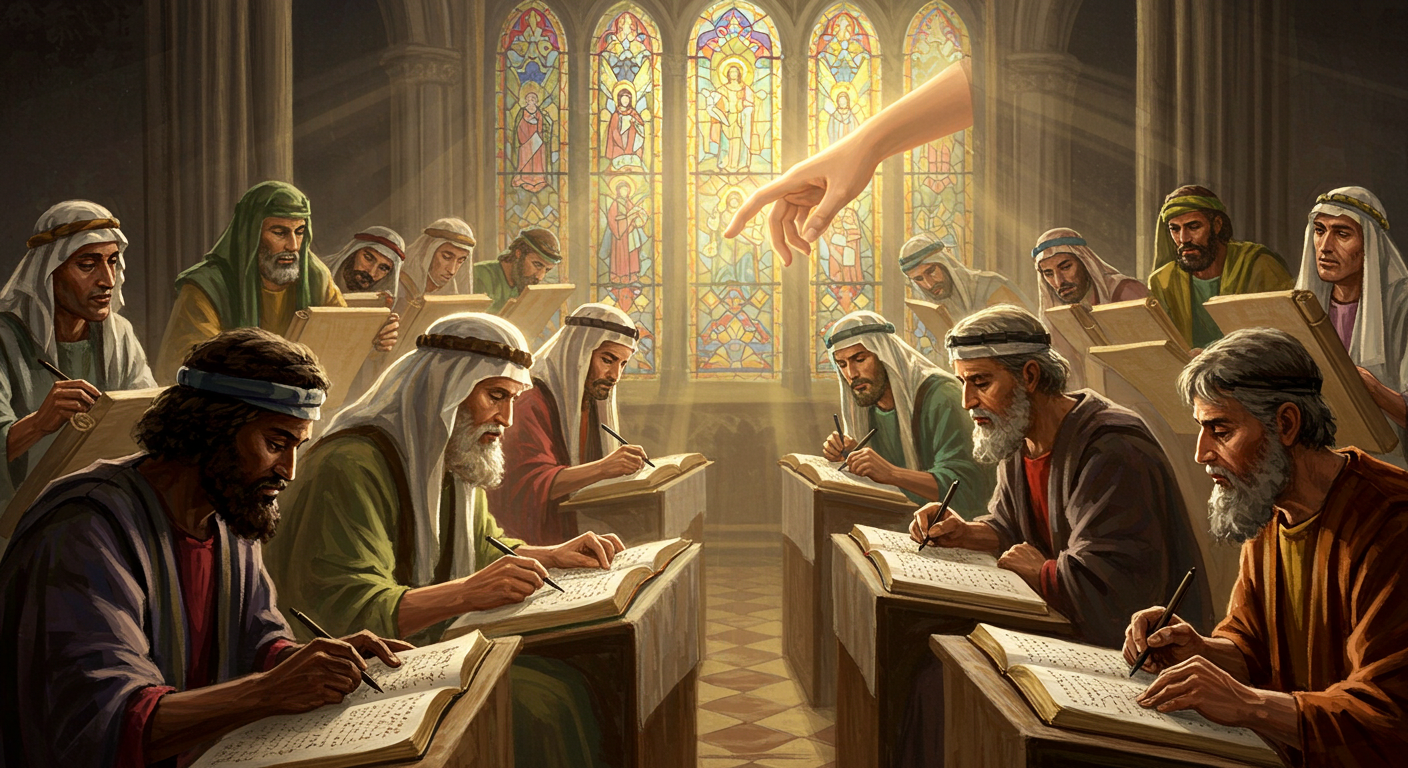Why The Bible’s Writing Process Shows God’s Hand
You may have wondered how a book made up of many books, written over centuries by different people in different places, can hang together so beautifully. The phrase Bible writing process points to something more than mere human authorship; it points to a story of divine guidance threaded through history. When you look at how the Bible came to be — its authors, its context, its preservation, and its unity — you begin to see evidence that God was at work in and through the process.
The aim of this article is simple: to walk with you through the Bible writing process and show how that process itself bears witness to God’s hand. I’ll bring Scripture into the conversation at every turn so that your faith is built on God’s Word, not merely opinion.
What do you mean by “Bible writing process”?
When you say Bible writing process, you’re talking about several interconnected things: who wrote the books of the Bible, when and why they wrote them, how the texts were preserved and transmitted, how early communities recognized certain writings as authoritative, and how the Holy Spirit played a role in inspiring the words. It’s not a single event, but a long, detailed process that spans time and touches many lives.
Understanding this process helps you see that the Bible is not a random collection of religious musings. It’s a coherent witness that came through human hands and divine direction. The Bible itself affirms that it is inspired and useful for teaching and training, as the apostle Paul reminds us in 2 Timothy 3:16. Take that verse into your heart as we go on.
Multiple authors across eras — and surprising unity
You might be surprised to learn that the Bible’s books were written by scores of authors: shepherds, kings, prophets, fishermen, scholars, a physician, a tax collector, and more. They lived across a span of roughly 1,500 years. Yet when you read the Bible from Genesis to Revelation, you’ll notice a remarkable consistency in themes and purpose — a unity that’s hard to explain by human ingenuity alone.
This unity doesn’t mean every book sounds the same. The diversity of voice is one of the Bible’s strengths. It gives you poetry, history, law, prophecy, letters, and narrative in ways that speak to different parts of your heart. Despite the variety, the central storyline — creation, fall, redemption, and restoration — carries through. That continuity is part of what makes the Bible writing process so compelling.
The human authors and their circumstances
Behind each book of the Bible is a person with joys, sorrows, struggles, and triumphs. Moses led a nation and wrote the law and history. David wrote songs from his shepherd’s beginnings and from a king’s throne. Isaiah and Jeremiah prophesied during times of crisis. Paul wrote letters from prison and from missionary journeys. Luke, the physician, carefully researched and compiled orderly accounts. John, an eyewitness to Jesus, wrote with an intense spiritual tone.
The Bible recognizes this human element. Hebrews tells you that God spoke to the fathers through prophets at many times and in various ways, and in these last days He has spoken to us by His Son (Hebrews 1:1-2). At the same time, the Scriptures teach that the men who wrote were moved by the Holy Spirit (2 Peter 1:21). That combination — human authors with real-life contexts and divine leading — shapes the Bible writing process and underscores that the Bible is both human and heavenly.
You see character and context in the text
When you read the Psalms, you sense David’s heart; when you read Isaiah, you feel the prophet’s burden for God’s holiness and judgment. Recognizing authorial context helps you interpret Scripture more wisely. The Bible writing process didn’t happen in a vacuum; it happened in real situations where God met people and moved them to write.
Consistent theological center: God, sin, and salvation
If you’re trying to determine whether the Bible writing process points to divine authorship, look at the theological center. From the Law to the Gospels to the epistles, the Bible consistently points to God’s holiness, humanity’s need, and God’s provision for redemption through grace. That isn’t merely a recurring theme; it’s the heart of the message.
Scripture doesn’t shy away from your condition. It tells you plainly that all have sinned (Romans 3:23), but it also tells you of God’s astounding love: while you were still a sinner, Christ died for you (Romans 5:8). This unbroken thread shows that the Bible writing process was not an aimless accumulation of religious thoughts but a deliberate transmission of God’s plan to reconcile you to Himself.
Prophecy and fulfillment as evidence in the Bible writing process
One of the most powerful ways the Bible reveals God’s hand is through prophecy and its fulfillment. Prophetic texts were written long before their fulfillment, and when you examine their accuracy, you begin to see that something beyond mere human forecasting is at work.
Consider Micah’s ancient prophecy that the Messiah would be born in Bethlehem: Micah spoke it centuries before the event (Micah 5:2. Then Matthew cites that expectation when describing Jesus’ birth (Matthew 2:6. Or think of Isaiah’s portrayal of the suffering servant, which reads uncannily like the New Testament account of Christ’s atoning work (Isaiah 53:4-6. These connections are part of the Bible writing process that testify to a guiding hand.
Prophecy isn’t just about predicting events; it’s about God shaping history so that His purposes are fulfilled. The coherence of prophecy and fulfillment illustrates that the Bible is more than a human product; it’s a divinely orchestrated revelation.
Textual preservation and transmission
You may wonder: even if the Bible was inspired, can you trust the words we have today? That’s a fair question. The Bible writing process includes copying, translating, and transmitting texts across generations. The remarkable thing is how well the Scripture has been preserved.
Ancient manuscripts, like those among the Dead Sea Scrolls, confirm the reliability of the Old Testament text. For the New Testament, thousands of manuscript copies exist, far more than for any other ancient document. The Bible itself assures you of its endurance: “Heaven and earth will pass away, but my words will never pass away” (Matthew 24:35. And the psalmist rejoices in the enduring and true nature of God’s Word: “The entirety of Your word is truth” (Psalm 119:160.
These are not miraculous claims of textual invulnerability but rather a testimony to careful copying, reverent preservation, and the providential oversight that can be seen as part of the Bible writing process.
Why the details of transmission matter to you
When you’re reading Scripture for direction, comfort, or conviction, you want to know the text you’re holding is close to what the original authors wrote. The painstaking work of scribes, scholars, and translators — guided by a long history of careful stewardship — means you can approach the Bible with confidence. That confidence is not blind; it’s supported by evidence and by the witness of the Church through the ages.
The role of the Holy Spirit in the Bible writing process
You’re never left to interpret Scripture on your own. The Bible consistently points to the Holy Spirit’s role in both inspiring the original authors and illuminating the meaning of the text for believers. The promise of the Spirit’s guidance is given by Jesus when He says the Spirit will guide you into all truth (John 16:13. The apostle Peter reminds you that prophecy did not come from human will but from people moved by the Holy Spirit (2 Peter 1:21.
This means the Bible writing process is not merely a historical curiosity; it’s an ongoing spiritual reality. When you come to Scripture praying for understanding, the same Spirit who inspired the words can help you receive them. That’s why Paul could write that Scripture is profitable for teaching, rebuking, correcting, and training in righteousness (2 Timothy 3:16 — because God’s Spirit works through the text.
Canon formation: how the church recognized Scripture
The Bible didn’t fall out of the sky as a bound volume. The process by which the diverse books were recognized as canonical — that is, as Scripture — is an important chapter in the Bible writing process. Early Christians and Jews used several practical tests: apostolicity (is the book connected to an apostle or a prophet?), orthodoxy (does it teach the faithful doctrine of God and Christ?), and catholicity (is it widely used in the churches?).
Over time, communities recognized the authority of certain writings because those writings consistently brought people to Christ, bore the fruit of the Spirit, and aligned with the broader witness of the Church. The New Testament letters were treasured, copied, read in gatherings, and referenced by early leaders.
You can look at this recognition as not merely bureaucratic but as a spiritual process where the body of Christ — guided by the Spirit — discerned what truly belonged to God’s revelation. That recognition is part of the Bible writing process and strengthens your confidence that you possess the books God intended for the Church.
Archaeology and historical corroboration
If you’re concerned about the Bible’s historical reliability, archaeology offers encouraging news. Excavations have confirmed many of the Bible’s historical settings, place names, and cultural details — from inscriptions mentioning kings to the discovery of cities and artifacts that align with biblical narratives.
Archaeological evidence doesn’t prove every theological claim, but it does show that the Bible’s authors were writing about real people and historical events. The more you look into the historical and cultural context, the more you see how the Bible writing process produced accounts rooted in reality — a reality that God used to reveal Himself to you through time.
How the Bible writing process affects your faith
Understanding how the Bible came to you isn’t just academic. It has a profound personal impact. When you grasp that the Bible writing process involved real people guided by God’s Spirit, preserved through careful stewardship, and recognized by the believing community, your trust in Scripture deepens. You can come to the Bible expecting to meet God, not merely to read a book.
This understanding empowers you to stand on Scripture as a foundation for life decisions, moral clarity, and spiritual comfort. It invites you to submit your life to the living Word, confident that the message you receive is not the product of chance but part of God’s redemptive plan.
Practical ways to engage Scripture faithfully
If you want to lean into the Bible writing process in your daily life, start with prayer. Ask the Spirit to lead you into truth (John 16:13. Read regularly, meditate on passages, and compare Scripture with Scripture. Use trustworthy translations and reliable study resources. Above all, apply what you read — Scripture was written for teaching and training so that you may be equipped for every good work (2 Timothy 3:16.
Objections and honest questions
You’re not alone if you have questions: What about apparent contradictions? How do translations affect meaning? Didn’t the Bible change over time? These are valid concerns and part of a responsible engagement with the Bible writing process.
The first step is humility. Approach difficult passages with the desire to understand rather than to dismiss. Look at context, original language nuances, and historical background. Scholars and pastors wrestle with hard texts; their tools and work can help you navigate apparent difficulties.
Responding to alleged contradictions
Some supposed contradictions fade when you account for genre, perspective, or the particular focus of a passage. In other cases, manuscript variants are minor and do not affect essential doctrine. The discipline of textual criticism exists to sift through these details and to reconstruct the most probable original text. The existence of variants is not evidence against inspiration; rather, it is evidence of the Bible’s long life and faithful transmission. The key is to trust the larger testimony of Scripture and to seek counsel when you’re unsure.

The Bible writing process and the heart of your life
At the end of the day, the Bible writing process points you to a relationship. The Scriptures were not compiled to satisfy curiosity alone; they were given to lead you to God. John tells you that the Word became flesh and lived among us, showing the glory of God (John 1:14. The process that produced the Bible aims at restoring your fellowship with the living God.
When you take God’s Word seriously, you’ll find it transforms you. It corrects, comforts, convicts, and guides. It points you to Christ, who is the center of Scripture and the fulfillment of God’s redemptive plan.
Final reflections: God’s hand in the long story
As you reflect on the Bible writing process, notice the threads that weave together: multiple authors from diverse backgrounds, a consistent redemptive storyline, fulfilled prophecy, careful preservation, and the Spirit’s guiding role. These elements together point to more than a human product. They point to a divine hand shaping history so that you might hear God’s voice in writing.
You don’t have to ignore questions and doubts. In fact, honest questioning can deepen your faith if it leads you to study Scripture more carefully and to pray for understanding. The Bible invites you not only to believe facts about God but to trust in God Himself. Scripture is a lamp to your feet and a light to your path (Psalm 119:105 — and the Bible writing process is the story of how that lamp was readied for you.
If you wonder what your next step should be, start with a simple discipline: read a Gospel slowly this week and pray as you read. Ask the Holy Spirit to illuminate the text. Let the Word speak to the condition of your heart, and be prepared to respond.
If you want to keep exploring, read passages that explain the nature of Scripture itself, such as the psalms and the New Testament letters. The Bible claims to be God’s word, useful for teaching and training in righteousness (2 Timothy 3:16, and it invites you to a life transformed by God’s truth. Trust that as you engage the Bible writing process faithfully, God will meet you there.
Explore More
For further reading and encouragement, check out these posts:
👉 7 Bible Verses About Faith in Hard Times
👉 Job’s Faith: What We Can Learn From His Trials
👉 How To Trust God When Everything Falls Apart
👉 Why God Allows Suffering – A Biblical Perspective
👉 Faith Over Fear: How To Stand Strong In Uncertain Seasons
👉 How To Encourage Someone Struggling With Their Faith
👉 5 Prayers for Strength When You’re Feeling Weak

📘 Jesus and the Woman Caught in Adultery – Grace and Mercy Over Judgement
A powerful retelling of John 8:1-11. This book brings to life the depth of forgiveness, mercy, and God’s unwavering love.
👉 Check it now on Amazon
As a ClickBank & Amazon Affiliate, I earn from qualifying purchases.
Acknowledgment: All Bible verses referenced in this article were accessed via Bible Gateway (or Bible Hub).
“Want to explore more? Check out our latest post on Why Jesus? and discover the life-changing truth of the Gospel!”






